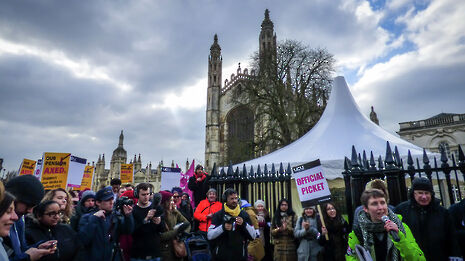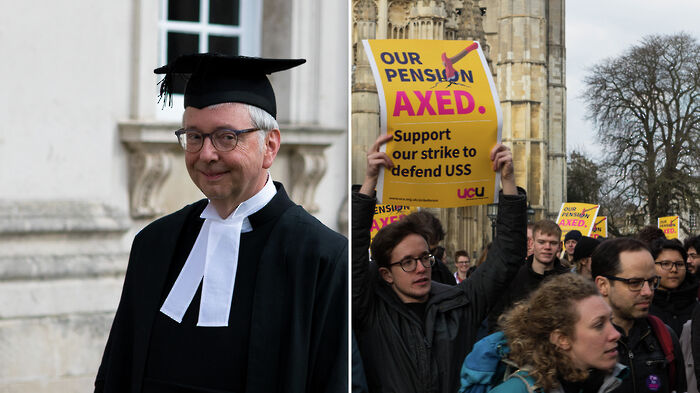Cambridge staff hit pickets again as national bodies say they will resume talks
Varsity rounds-up the second day of strikes as academics mix poetry with protest, and the vice-chancellor speaks out

Cambridge academics returned to picket lines outside faculty and University buildings, held poetry readings and staged readings outside Senate House today, on the second day of walk-outs over a national pension dispute.
The day was marked by Cambridge vice-chancellor Stephen Toope calling for the resumption of negotiations, amid the revelations that several Oxbridge colleges may have influenced the decision-making process behind the reforms.
Academic staff in across Cambridge continued to strike, as part of fourteen planned days of industrial action to pressure universities into rejecting pension schemes reforms put forward by Universities UK (UUK).
What days are the strikes landing on?
Escalating strike action will run until the end of term, meaning walkouts during Weeks Six, Seven and Eight.

Strikes will continue until the resolution of a dispute between the Universities and Colleges Union (UCU), a union for academics, and UUK over a proposed pension change that UCU has labelled “the biggest pay cut in higher education history”. The two bodies today agreed to resume talks from next week.
Disruption in Cambridge, as Toope calls for talks
In Cambridge, the strike forced the cancellation of the annual Sir David Williams law lecture, which was due to be delivered today by Canada’s former Chief Justice, the Rt. Hon. Beverley McLachlin. Waseem Yaqoob, the UCU branch secretary for Cambridge, called the cancellation “disappointing”, but claimed that such disruption was the fault of the UUK’s failure to negotiate. “Staff at Cambridge feel they have been left with no choice.”
Lectures and supervisions organised by faculties were cancelled throughout the University, with staff re-forming their picket lines from the previous day. Many students showed support once again, joining in with the protests. Outside the English Faculty at midday, a crowd gathered to perform protest poetry.

Yaqoob was present at a large rally held in the afternoon outside Senate House. There, he said that pensions were “the tip of the iceberg” in terms of the problems faced by academia. Several other speakers made speeches, including Peter Sarris, a member of the History Faculty and Labour councillor for East Chesterton. Sarris claimed that strikers are “fighting” for “the future viability of the entire higher education system”, promising to “send the entire University examination system crashing to its knees” if negotiations did not progress.
While the rally was taking place, the University released a statement by the vice-chancellor, Stephen Toope. In this, he said that “an immediate resumption” of talks between the UUK and the University and College Union was “imperative for everybody’s sake”.
Upon receiving the news, Yaqoob claimed that the vice-chancellor had “joined the dissenters”. Nevertheless, he said, the UCU would maintain its pressure “so that the whole of the UUK are unanimous in returning to the negotiating table”.
UUK calls for negotiations amid strike pressure
Nationally, the main bodies involved took a major step towards a resolution, with UUK and UCU agreeing to return to the negotiating table.
The strikes and protests were organised by UCU in response to the UUK’s proposal to replace defined benefit pension schemes for university staff incomes under £55,000 with defined contribution pension schemes, which the UCU claim to be less stable. 57 Universities across the country have been affected by the strike.
UUK asked UCU to “return to talks on the future of the USS pension scheme” this afternoon, saying: “It is of paramount importance that both sides make every effort to meet – despite the ongoing industrial action – to stop any impact and disruption to students.”
UCU confirmed it would attend, but said “unless the employers were prepared to talk about the January decision to slash pensions then it did not see how the dispute could be resolved”.
The announcement was welcomed by Sam Gyimah, the universities minister, who tweeted UCU should suspend strikes and engage with talks “in the interest of students”.
Student campaign group Cambridge Defend Education said is “more evidence that the strike is working”, but added: “There is only a prospect of resolving this dispute if UUK are prepared to reverse their decision to slash pensions, which they have not committed to doing. We have come a long way this week, but there is further to go.”
‘No collusion’ between colleges and University, Toope says
Reforms to pensions proposed by UUK were based on a consultation over the future of its pension scheme, the Universities Superannuation Scheme (USS), which was sent in September to more than 350 employers. As a result of the survey, a decision was made to take a more moderate approach to risk”, as informed by the responses of 116 institutions. 42% of these institutions (49 in total) called for “less risk to be taken.” UUK cites a deficit of £7.5bn in the national pension scheme for university staff. The UCU claims that an average lecturer will be almost £10,000 worse off in retirement per year as a result of the pension reforms.
However, it was recently revealed that 16 Oxbridge colleges were individually included in the count, causing some parties to criticise Oxford and Cambridge as over-influencing UUK’s decision-making. A leaked email from the Bursars’ Committee’s Pensions Sub-Committee to colleges appeared to encourage a coordinated response to the Universities UK (UUK) survey, in support of a move towards the defined contribution scheme. Yaqoob argued that such a move was a betrayal of academics by bursars who “circumvented” the collegiate system in order to attack staff pensions.”
In a statement today, the University said that there was “no collusion” by the colleges in attempting to minimise risk. The claims were also disputed by the head of the Bursars’ Committee, who told Varsity that in advocating for pensions reforms, colleges were “concerned about the risk to the USS pension scheme, not the risk to particular investments” in the stock market. It is not yet known which Cambridge colleges responded to the survey
 News / Judge Business School advisor resigns over Epstein and Andrew links18 February 2026
News / Judge Business School advisor resigns over Epstein and Andrew links18 February 2026 News / Gov grants £36m to Cambridge supercomputer17 February 2026
News / Gov grants £36m to Cambridge supercomputer17 February 2026 News / Hundreds of Cambridge academics demand vote on fate of vet course20 February 2026
News / Hundreds of Cambridge academics demand vote on fate of vet course20 February 2026 News / CUCA members attend Reform rally in London20 February 2026
News / CUCA members attend Reform rally in London20 February 2026 News / Union speakers condemn ‘hateful’ Katie Hopkins speech14 February 2026
News / Union speakers condemn ‘hateful’ Katie Hopkins speech14 February 2026










